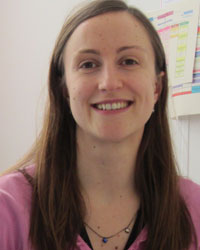Véronique Izard
 CNRS & Université Paris Descartes, France
CNRS & Université Paris Descartes, France
http://lpp.psycho.univ-paris5.fr/person.php?name=VeroniqueI
What does your research focus on?
In my research, I am trying to understand the foundations of mathematical thinking. How much of mathematical thinking is grounded in universal intuitions, common to all human beings? What part of mathematics consists of cultural inventions, transmitted through generations?
What drew you to this line of research? Why is it exciting to you?
I was originally trained as an engineer, and being fascinated by the beauty of mathematics, I majored in pure maths. At the end of college, I was going to enroll for a theoretical math PhD, until, out of pure luck, I stumbled upon a leaflet on a cognitive science graduate program. I fell in love with this science instantly. It offered a method to address empirically the philosophical questions that intrigued me about math, such as: why do we do math? How is it that our mind is able to construct something so perfect and complex, while being so fallible? Why do we feel that math is about truth?
Who were/are your mentors or psychological influences?
I have had the privilege to work with two geniuses of cognitive psychology: Stanislas Dehaene and Elizabeth Spelke. I came to Stan knowing nothing of cognitive science, and I came to Liz knowing nothing of developmental psychology. They taught me everything. In a more informal way, I was also very much inspired by the people I worked with in graduate school, especially Philippe Pinel, who made me realize that a paper of science must also be a piece of art, and Christophe Pallier, who is a great example of humility and rightness.
To what do you attribute your success in the science?
You ask about my “success” but I just feel so ignorant still. If you mean how have I managed to publish the articles I did, I guess I was lucky to work at the right moment with the right people. Perhaps the fact that I haven’t had the same training as my colleagues has also helped somewhat, as I bring a different perspective and different technical skills.
What’s your future research agenda?
I am very excited about a new project on geometry. I am trying to take the questions that have brought us forward about numbers, and apply them to the domain of geometry: do we have abstract representations of geometric properties? Are those representations present early in life? Do they enter into geometric computations? How do our geometric representations change over a life-time, and how do they vary across cultures?
Any advice for even younger psychological scientists? What would you tell someone just now entering graduate school or getting their PhD?
I would give two pieces of advice. The first, do only what you really believe in. Do not do something just because your supervisor asks you to do it because, in the end, it is you who has to stand for your work, and you can only do so if you fully believe in every decision you take down the road. Second, remember to always listen to everybody. When people disagree with you, they have something to tell you about something you have overlooked, or something you explained poorly.
What publication are you most proud of or feel has been most important to your career?
Last summer I wrote a chapter for the upcoming Attention & Performance volume, which presents a theoretical rationale for the research I am doing in geometry. Sometimes finding out how to ask a question is already half of the work, and this is what this paper was doing for me. In fact, after the paper was published, I (finally!) started reading Randy Gallistel’s 1990 book and found that he had made similar theorizing long before me, only with further depth — but still, I was quite proud to have converged with such a mind!
Izard, V., Pica, P., Dehaene, S., Hinchey, D., & Spelke, E.S. (in press). Geometry as a universal mental construction. Attention and Performance.





APS regularly opens certain online articles for discussion on our website. Effective February 2021, you must be a logged-in APS member to post comments. By posting a comment, you agree to our Community Guidelines and the display of your profile information, including your name and affiliation. Any opinions, findings, conclusions, or recommendations present in article comments are those of the writers and do not necessarily reflect the views of APS or the article’s author. For more information, please see our Community Guidelines.
Please login with your APS account to comment.